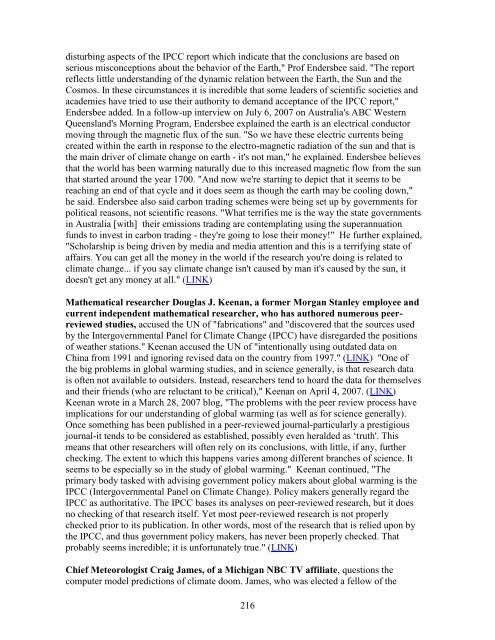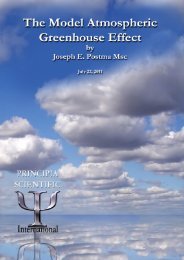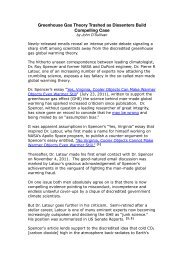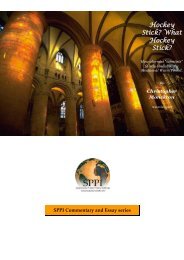Than 1000 International Scientists Dissent Over Man-Made Global ...
Than 1000 International Scientists Dissent Over Man-Made Global ...
Than 1000 International Scientists Dissent Over Man-Made Global ...
You also want an ePaper? Increase the reach of your titles
YUMPU automatically turns print PDFs into web optimized ePapers that Google loves.
disturbing aspects of the IPCC report which indicate that the conclusions are based on<br />
serious misconceptions about the behavior of the Earth," Prof Endersbee said. "The report<br />
reflects little understanding of the dynamic relation between the Earth, the Sun and the<br />
Cosmos. In these circumstances it is incredible that some leaders of scientific societies and<br />
academies have tried to use their authority to demand acceptance of the IPCC report,"<br />
Endersbee added. In a follow-up interview on July 6, 2007 on Australia's ABC Western<br />
Queensland's Morning Program, Endersbee explained the earth is an electrical conductor<br />
moving through the magnetic flux of the sun. "So we have these electric currents being<br />
created within the earth in response to the electro-magnetic radiation of the sun and that is<br />
the main driver of climate change on earth - it's not man," he explained. Endersbee believes<br />
that the world has been warming naturally due to this increased magnetic flow from the sun<br />
that started around the year 1700. "And now we're starting to depict that it seems to be<br />
reaching an end of that cycle and it does seem as though the earth may be cooling down,"<br />
he said. Endersbee also said carbon trading schemes were being set up by governments for<br />
political reasons, not scientific reasons. "What terrifies me is the way the state governments<br />
in Australia [with] their emissions trading are contemplating using the superannuation<br />
funds to invest in carbon trading - they're going to lose their money!" He further explained,<br />
"Scholarship is being driven by media and media attention and this is a terrifying state of<br />
affairs. You can get all the money in the world if the research you're doing is related to<br />
climate change... if you say climate change isn't caused by man it's caused by the sun, it<br />
doesn't get any money at all." (LINK)<br />
Mathematical researcher Douglas J. Keenan, a former Morgan Stanley employee and<br />
current independent mathematical researcher, who has authored numerous peerreviewed<br />
studies, accused the UN of "fabrications" and "discovered that the sources used<br />
by the Intergovernmental Panel for Climate Change (IPCC) have disregarded the positions<br />
of weather stations." Keenan accused the UN of "intentionally using outdated data on<br />
China from 1991 and ignoring revised data on the country from 1997." (LINK) "One of<br />
the big problems in global warming studies, and in science generally, is that research data<br />
is often not available to outsiders. Instead, researchers tend to hoard the data for themselves<br />
and their friends (who are reluctant to be critical)," Keenan on April 4, 2007. (LINK)<br />
Keenan wrote in a March 28, 2007 blog, "The problems with the peer review process have<br />
implications for our understanding of global warming (as well as for science generally).<br />
Once something has been published in a peer-reviewed journal-particularly a prestigious<br />
journal-it tends to be considered as established, possibly even heralded as ‗truth'. This<br />
means that other researchers will often rely on its conclusions, with little, if any, further<br />
checking. The extent to which this happens varies among different branches of science. It<br />
seems to be especially so in the study of global warming." Keenan continued, "The<br />
primary body tasked with advising government policy makers about global warming is the<br />
IPCC (Intergovernmental Panel on Climate Change). Policy makers generally regard the<br />
IPCC as authoritative. The IPCC bases its analyses on peer-reviewed research, but it does<br />
no checking of that research itself. Yet most peer-reviewed research is not properly<br />
checked prior to its publication. In other words, most of the research that is relied upon by<br />
the IPCC, and thus government policy makers, has never been properly checked. That<br />
probably seems incredible; it is unfortunately true." (LINK)<br />
Chief Meteorologist Craig James, of a Michigan NBC TV affiliate, questions the<br />
computer model predictions of climate doom. James, who was elected a fellow of the<br />
216





